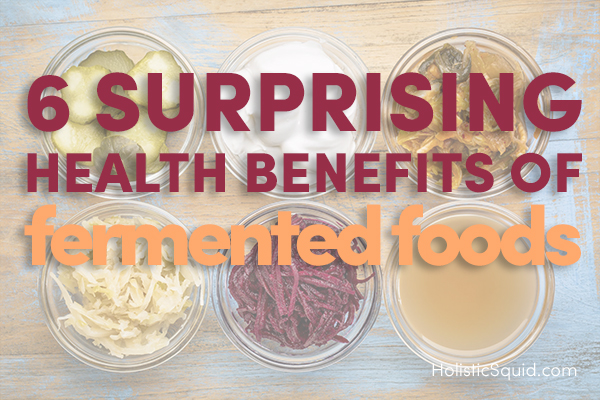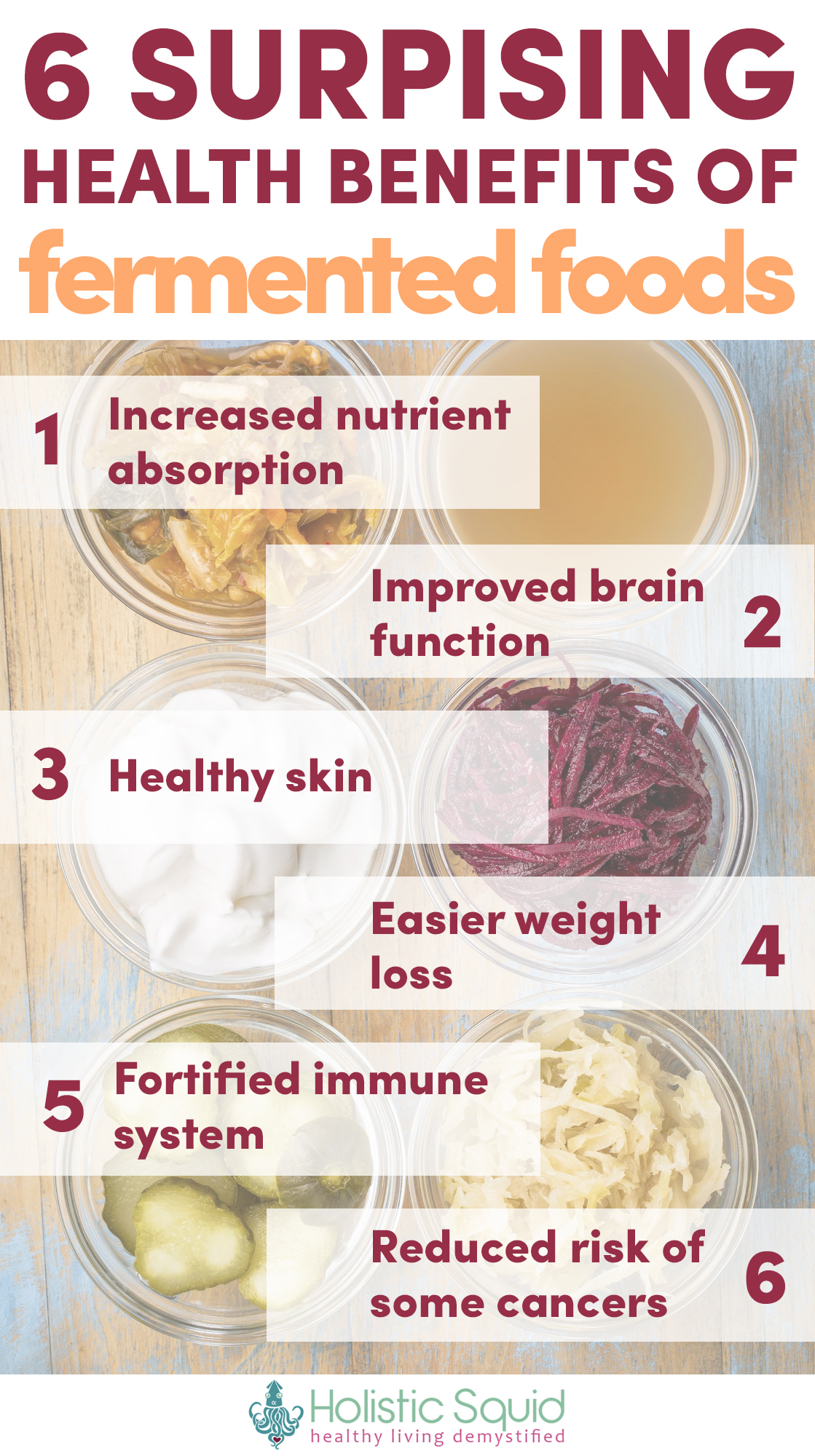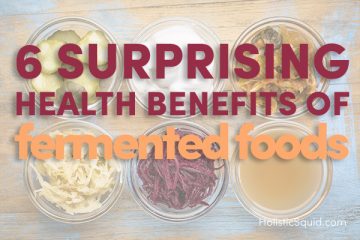

I've written lots before on the health benefits of fermented foods, and for good reason. Apart from weird crunchy mamas like me who serve my kids sauerkraut with breakfast, make my own cultured ketchup, and have kombucha brewing on my countertop, fermented foods are a part of traditional diets that have been all but forgotten in our modern convenience-driven way of life.
I believe it's time for a resurgence.
The practice of deliberately letting foods sour or ferment outside of refrigeration (also called lacto-fermentation or culturing) not only makes foods diversely delicious, it also improves their digestibility and introduces essential beneficial microbes into our diets as well.
The more we reconnect with these foods, the more we realize that the health benefits of fermented foods extend far beyond a healthy tummy.
Learning from our ancestors
Nearly every traditional culture has enjoyed fermented foods as part of their regular diet. In Asian countries, fermented soybean paste and pickled fruits and veggies pair with most meals. In El Salvador they ferment the core of pineapple into vinegar. In Eastern Europe, sauerkraut and pickles pair with many dishes. Many cultures enjoy cheeses that have live cultures intact. Fish ferments into lox. Beef cures into pastrami. Even wine and unpasteurized beer are fermented.
Show me a traditional culture that thrived in human history, and I'm sure we can point to at least one – if not several – fermented food that they regularly consumed.
These days, traditional food prep practices have become less of a necessity, as we've opted for so called ‘easier' techniques that provide long shelf stability. We use vinegar to pickle cucumbers and pasteurized everything to make it more shelf-stable.
Growing up in the 80's, the only fermented food I consumed on a regular basis was non-fat yogurt. It was something, but probably not enough to prevent teenage acne and mood swings, and a host of low level digestive imbalances.
These days, fermented foods are starting to make a comeback. It's not unusual to find health food store shelves stocked with kombucha, kimchi, miso, and traditionally prepared sauerkraut. On a good day, I can even buy unpasteurized soy sauce or coconut water kefir.
Aside from simply enhancing their nutritional profile and improving digestive health, you may be surprised to learn of some less well-known health benefits of fermented foods.
6 surprising health benefits of fermented foods
#1 – Fermentation increases nutrient absorption
Eat all of the “good food” that you want, but if it never gets broken down and absorbed properly, the nutritional benefits are minimal.
Raw fermented foods create active organisms that get to work as soon as they enter our bodies. They help balance your gut bacteria (with probiotics), deliver important enzymes, and balance your stomach acid pH, all of which increases your ability to break down foods so nutrients are more available to you. (source)
Study after study has found that fermenting foods increases the bioavailability of minerals through the breakdown of phytate (an “anti-nutrient”) and the fortification of folate, among other effects. (source) An increase in the intake of foods such as sauerkraut and homemade yogurt has been shown to increase the bioavailability of B vitamins and K2 in the body.
Other nutrients found to be more bio-available through fermentation include biotin, riboflavin omega-3 fatty acids and folic acid. (source)
#2 – Fermented foods can improve brain function
When it comes to psycho-emotional conditions, western medicine offers some band aid solutions, but none that actually address the root cause. Fermented foods may be part of a lasting solution.
Research shows probiotic activity can help improve brain function which can lead to a positive effect on mood and fatigue. The presence of the helpful bacteria in the gut can increase the body's production of certain neurochemicals, like gamma-aminobutyric acid which relieves anxiety, improves mood, reduces symptoms of PMS and has been found to treat ADHD. (source)
GABA (a.k.a.Gamma-aminobutyric acid) is actually a supplement readily available in health food stores. Although supplements can be helpful in the short term, you can begin to address the root cause of mood-related conditions with a nutrient dense diet rich in well-sourced saturated fats and protein and fermented foods.
#3 – Fermented foods promote healthy skin
It's no mystery that the health of our skin is linked to what we put in our bodies.
A 2007 Swedish study showed that infants with low levels of healthy intestinal flora were more likely to develop eczema.
Additionally, an overabundance of toxins and undigested material in our intestines can contribute to “leaky gut syndrome.” This can cause an inability to eliminate these materials correctly. Our body needs to purge somehow, and this happens through the skin in the form of anomalies like pimples, bumps, rashes and eczema.
Beyond fermented foods, be sure to consume a diet that includes homemade bone broth and plenty of well-sourced animal fats to help support healthy, radiant skin.
#4 – Fermented foods can help with weight loss
Research shows that healthy gut flora has a significant impact on the regulation of weight loss and energy availability. The rate at which we metabolize calories is increased when the amount of probiotics in our system is higher.
Additionally, it has been found that when our intestines are damaged by bad bacteria, inflammation and poor digestion increase the chances of metabolic disorders known to be connected to weight gain and a decreased ability to burn calories efficiently. (source)
#5 – Fermented foods can fortify your immune system
Your gut is one of the first places unwelcome and detrimental organisms enter your body. About 70% of your body’s immune cells reside in your gut. (source)
When your gut is an unhealthy environment that supports bacterial bad guys (high sugar intake, etc), you are more vulnerable to colds, flus and other infections because your body is working overtime just to regulate things.
With an increase in good bacteria, it follows that there is less room for bad bacteria to flourish. The more you replace bacteria and the compounds that feed them with healthier organisms, the less chance you'll end up with disease causing inflammation and other reactions the body has to foreign substances.
#6 – Fermented foods can help reduce the risk of some cancers
Inflammation is suspected to be a large contributing factor is many cancers, and as we've discussed, a diet that includes fermented foods can decrease inflammation in our bodies.
In addition to significant evidence that, in general, many foods we eat can contribute to cancer prevention, it has also been found that eating raw cultured vegetables helps prevent colon cancer because of the lactic acid’s ability to inhibit cell mutation. (source) Specifically, fermenting cabbage into sauerkraut or kimchi increases glucosinolate compounds that are believed to have cancer fighting properties.

Ready to make your own?
These days you can find an array of probiotic rich, fermented foods at your local health food store. If you're ready to get started making your own, you'll find that homemade ferments will save you a ton of money (and are fun too!).
Here are a few:
- Purple Garlic Sauerkraut is super delicious. It can be eaten alone or as part of a colorful salad
- Easy Peasy Pomegranate Soda – quick and tasty way to get the kids to try fermented drinks.
- Cultured Ketchup – Kid-friendly AND nutritious
- How to Make Kombucha – a step-by-step guide – Get your kombucha starter kit here
- Easy Countertop Yogurt – No special machine required
- Old fashioned Homemade Root Beer – SO good.
- Ginger Bug, with just 3 ingredients – a perfect starter to make probiotic-rich sodas.
Not ready to make your own? Click here for a great source to order fermented veggies online.
Surprised by the health benefits of fermented foods?
Let's talk about it in the comments below.










Hi Emily,
I love fermented foods and so do my kids. So it was much to my dismay when, last year, they started giving me (contributing to) reflux. Now I can only have the tiniest bits and only with food (no kombucha on its own). Any ideas about how to get back to consuming them in quantity without acid? Thanks!
I’ve heard many success stories from people using apple cider vinegar for reflux. 1 Tablespoon raw apple cider vinegar in a glass of warm water first thing in the morning. It helps something with your stomach acid being adequate.
Hi Ruthie, thanks for your question. It’s hard to know what could be causing this without knowing full health history and diet but I would recommend that you try to take probiotics & consume lots of bone broth as a first. Then you can start trying to add fermented food back in to your diets in small amounts along with food. Hope this helps!
Half of your mentioned benefits I knew. Thanks author for other 2. Great article.
Thanks for bringing to my attention that eating fermented foods like sauerkraut can increase the absorption of nutrients. I’ve been looking for ways to change my diet and add things that will help me live a more healthy lifestyle. Perhaps it would be a good idea to eat sauerkraut every once in a while to improve the nutrient absorption in my body.